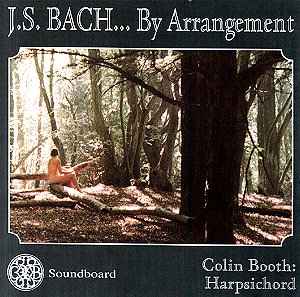
Sonata in D minor BWV 964, arranged by J S Bach from his own Sonata
in A minor for solo violin.
Concerto in C major, BWV 976, arranged by J.S.Bach from a violin concerto
by Vivaldi.
Suite in Cminor W.62/6, reconstructed from various manuscripts by Howard
Ferguson.
Chromatic Fantasy and Fugue in D minor, BWV 1004.
Chaconne in D minor, BWV 1004, arranged by Colin Booth from J S Bach's Partita
in D minor for solo violin.
Borrowing themes, re-arranging movements and transcribing whole sonatas and
concertos for other instruments was part of the stock in trade of 18th century
composers - both from their own earlier works and from those of other composers.
In some cases such practices might today cause disputes under the laws of
copyright and plagiarism. However the 18th century was free of such legal
impedimenta. What defined the greatness of a particular work was not so much
whether the thematic material was a de novo inspiration of the composer as
the skill with which the material was deployed in constructing a coherent
opus. In those days, relatively little music was published in print runs;
mostly it was passed from hand to hand in manuscript form then copied out
with such re-arrangements as the availability of performers and instruments
necessitated.
J. S. Bach was especially adept at the art of transcription; his skill was
such that it is usually impossible to discern from the arrangement what the
scoring of the original had been. This skill is amply illustrated by the
transcriptions for solo harpsichord on this disc of Bach's own violin sonata
in A minor and of a violin concerto by Vivaldi - so perfectly attuned are
they to exploiting the idiosyncratic potentialities of the double-decker
harpsichord. The performing realisations by Colin Booth are all but perfect
- to the extent that one becomes convinced that Bach has entered his soul
(or vice versa). The depth of Booth's insight is further demonstrated by
the performance of his own arrangement of Bach's Chaconne in D minor. All
the performances are convincing proof that Colin Booth is a musician who
lives and breathes harpsichord every waking (and sleeping?) moment. As the
accompanying notes explain, he has devoted much careful thought to matters
of interpretation: the use of improvisation where only homophonic chords
exist in the manuscript, the execution of ornamentation, and judgment of
tempi. Listeners need not (unless interested in doing so) concern themselves
with the minutiae of intellectual musicology; they can just bask in the resultant
total effect which on this disc sounds "just right". Throughout, the playing
has a natural authenticity - as distict from the over-prescriptive ostentatious
"authenticity" which regrettably afflicts so many Baroque performances these
days. This disc is keyboard playing par excellence and rates being an essential
acquisition for harpsichord devotees.
To those who simply cannot abide the sound of the solo harpsichord, I can
only say: "Go on! try it anyway - you might just be converted"
Reviewer
Humphrey Smith

